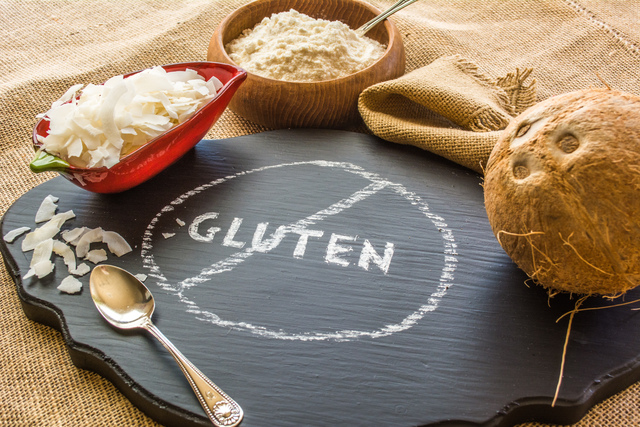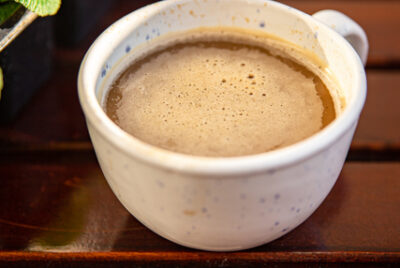Is Coffee Gluten-Free? Your Complete Guide
Welcome to this exciting exploration into the world of coffee and gluten. As a coffee enthusiast, I can understand why many coffee lovers are wondering, “Is coffee gluten-free?” Let’s dive in and find out!
Understanding Gluten
Before we dive into the heart of the matter, let’s shed some light on gluten itself. What is it exactly, and why is it a topic of concern for some people? This understanding will provide a clear perspective as we explore its presence or absence in coffee.
What is Gluten?
Gluten is a protein complex primarily found in grains such as wheat, rye, and barley. It is composed of two main proteins: glutenin and gliadin. Glutenin gives dough its elasticity, helping it rise and keep its shape during baking, while gliadin is responsible for the dough’s extensibility. It’s the gluten that gives bread its unique chewy texture.
In essence, gluten acts as a kind of glue, maintaining food’s structure and shape. It’s not just in bread and pasta; you’ll also find it in a surprising number of other products, such as sauces, salad dressings, and beer due to its thickening properties.
Why is Gluten a Problem for Some People?
While gluten poses no issues for most people, it can trigger adverse reactions in people with certain conditions. Let’s briefly touch upon these:
Celiac Disease: This is an autoimmune disorder where the ingestion of gluten leads to damage to the small intestine. It’s a serious condition that can lead to numerous health problems if not managed properly.
Wheat Allergy: People with a wheat allergy have an allergic reaction to wheat and wheat products. While gluten is a component of wheat, it’s important to note that this is an allergy to wheat specifically, not gluten.
Non-Celiac Gluten Sensitivity: Some people may not have celiac disease or a wheat allergy but still experience discomfort and health issues when they consume gluten. This is often referred to as non-celiac gluten sensitivity.
For those with these conditions, consuming a gluten-free diet is vital. Hence, knowing whether your beloved coffee contains gluten becomes quite significant!
The Basics of Coffee
Coffee Bean Composition
Coffee beans, in their most natural form, are the seeds of coffee cherries. These seeds are naturally gluten-free, which means pure, unprocessed, unflavored coffee beans are also gluten-free.
The Brewing Process
Brewing coffee involves passing hot water through the ground coffee beans. This process extracts the flavors and caffeine from the beans but should not introduce gluten into your cup of joe. (Speaking of water in coffee, find out if coffee dehydrates you here.)
Is Pure Coffee Gluten-Free?
Let’s get straight to the point – good news, coffee lovers! Pure, unflavored coffee, whether it’s instant or whole beans, is naturally gluten-free. This includes both regular and decaffeinated types.
Coffee is made from coffee beans, which are naturally devoid of gluten.
However, it’s worth noting that coffee is a complex mixture of hundreds of different compounds, and it is this complex mix that gives coffee its unique flavor profile and health benefits. Among these are several phenolic compounds, including chlorogenic acid, which has been shown to have numerous health benefits including antioxidant and anti-inflammatory effects.
Although coffee is naturally gluten-free, that doesn’t mean all coffee products are. Many instant coffee brands add fillers or flavors that could contain gluten. Always check labels carefully if you are buying instant coffee or coffee-flavored products.
When you’re brewing up your favorite cup of joe, the source of your coffee and the way it’s prepared can ensure it stays gluten-free. When in doubt, go for unflavored coffee beans, which you can grind yourself at home. This way, you can savor the rich aroma and bold taste of your coffee, without the worry of gluten. So, raise your mug and enjoy your gluten-free coffee journey!
Potential Gluten Contamination in Coffee
It’s now time to address the real question: could your cherished coffee unwittingly contain gluten? As a coffee aficionado myself, I understand how critical this question is for all those who are gluten-sensitive or live with celiac disease. Let’s break it down.
Coffee Beans and Gluten
By nature, coffee beans are gluten-free. They come from the Coffea plant, and gluten, as we know, is found in wheat, barley, and rye – all far removed from our beloved coffee. So, if you’re brewing your cup of joe from pure, unflavored coffee beans, you’re in safe territory.
The Risk of Cross-Contamination
Cross-contamination is a significant concern when it comes to gluten. This usually happens when gluten-free foods come into contact with foods that contain gluten. In the case of coffee, this could occur during the manufacturing process. For instance, if the equipment used to process the coffee beans is also used to process products that contain gluten, there’s a risk of cross-contamination.
Flavored Coffees and Additives
While pure, unadulterated coffee is naturally gluten-free, flavored coffees and coffee additives present a different story. The flavorings used in these coffees can contain gluten, which could be problematic for those with gluten sensitivity or Celiac disease.
Flavored coffees achieve their taste profile through the addition of flavoring agents after the roasting process. These flavorings could be natural or synthetic and might include ingredients like wheat, barley, or rye, all of which contain gluten. Since manufacturers aren’t required to list the ingredients of the flavorings, it can be challenging to determine if a flavored coffee is gluten-free just by looking at the package.
Coffee additives such as creamers, syrups, or whipped cream can also potentially contain gluten. For example, some non-dairy creamers might use a form of barley in their ingredients, and some flavored syrups can include hidden gluten.
As a rule of thumb, it’s always safest to check the label and see if it’s labeled as gluten-free. Many brands now recognize the importance of catering to a gluten-sensitive audience and have started clearly labeling their products as such.
But, what if you’re at a cafe or restaurant? When in doubt, it’s always best to ask. Most places are quite accustomed to dietary queries and will be able to guide you towards a choice that is safe for you to consume. After all, nothing should stand between you and a safe, delicious cup of coffee!
Instant Coffee
Instant coffee, also known as soluble coffee, presents an interesting case when it comes to the question of gluten. While you might assume that it’s as safe as regular coffee, that’s not always the case. Here’s why.
Instant coffee is made by brewing coffee in an industrial manner and then either freeze-drying or spray drying it to remove all the water, leaving behind just the soluble coffee solids. So, in theory, if the coffee beans and water used are gluten-free (which they typically are), the resulting instant coffee should also be gluten-free.
However, the challenge comes in the manufacturing process. Sometimes, manufacturers use fillers or flavorings in their instant coffee products to improve taste or create a unique product. These additives might contain gluten, thus making the instant coffee a potential risk for those with gluten intolerance or Celiac disease.
Furthermore, the risk of cross-contamination cannot be ignored. If the instant coffee is processed on the same equipment as products containing gluten, there’s a risk that the coffee may become contaminated.
So, when it comes to instant coffee, it’s best to check the label for a gluten-free certification. If the product isn’t certified as gluten-free, and you’re sensitive to gluten, you may want to steer clear or reach out to the manufacturer for more information. And remember, when it comes to health, it’s always better to be safe than sorry!
The bottom line? Pure, unflavored coffee beans are generally safe. However, you should be cautious of flavored coffees, additives, and possibly instant coffee. And, of course, always check the label or reach out to the manufacturer if you’re uncertain!
How to Enjoy a Gluten-Free Coffee
Alright, coffee lovers, let’s dive into how we can make sure our coffee remains a safe haven, free from gluten. Having to consider gluten in your coffee may feel like a minefield, but I promise it’s more straightforward than it initially appears. Here’s your easy-to-follow guide to ensuring a gluten-free coffee experience.
Opt for Whole Bean Coffee
The best way to ensure your coffee is gluten-free is by opting for whole bean coffee and grinding it yourself. The chance of whole coffee beans being cross-contaminated with gluten is very low. Plus, there’s something wonderfully therapeutic about the process of grinding your own coffee beans – the aroma, the anticipation of a fresh brew, it’s all part of the coffee experience.
Be Cautious of Flavored Coffees
Flavored coffees are where gluten can sneak in. If you do enjoy flavored coffee, it’s crucial to read the labels carefully. Check for gluten-containing ingredients or cross-contamination warnings. Better yet, contact the manufacturer directly for clarity. Many companies are becoming more aware of gluten issues and can provide this information.
Beware of Additives
Coffee additives like creamers and flavor shots can also be sources of hidden gluten. Always check the labels of these products. There are many gluten-free alternatives available on the market now, so you don’t have to miss out on these extras if you enjoy them in your coffee.
Invest in a Good Coffee Maker
A good coffee maker is a worthwhile investment for any coffee lover, but particularly so if you need to be sure your coffee is gluten-free. Single-serve coffee makers are less likely to be cross-contaminated with gluten, unlike shared coffee pots in places like workplaces, which can easily become contaminated.
Consider Gluten-Free Coffee Brands
Some brands explicitly label their coffee as gluten-free, providing an extra layer of reassurance. Do some research and find a brand you love and trust – this can make your coffee selection process much more comfortable.
Conclusion
So, to answer our initial question – yes, coffee is gluten-free in its purest form. But keep an eye out for potential sources of cross-contamination or gluten-containing additives. Enjoying your favorite brew can still be a simple, pleasurable experience, even if you’re living a gluten-free lifestyle!
FAQs
Is flavored coffee gluten-free? It can vary. Always check labels or contact manufacturers if you’re unsure.
Are coffee creamers gluten-free? Not all of them. Some brands use gluten-containing additives, so it’s important to read labels.
Can I drink coffee if I have celiac disease? Yes, you can, but ensure it’s a brand that certifies their coffee as gluten-free or stick with pure, unflavored coffee.
Can cross-contamination occur with coffee? It’s possible but rare. The risk is higher with flavored coffees and additives.
Is instant coffee gluten-free? Most instant coffees are gluten-free, but it’s always a good idea to check the label.
Regarding coffee and health, is coffee good for a sore throat? We cover whether coffee is good for a sore throat in this article here.




